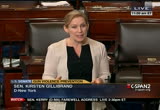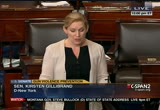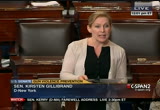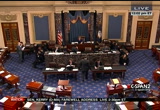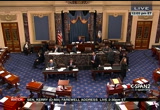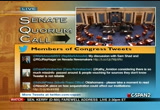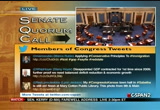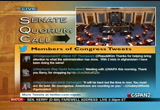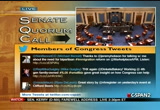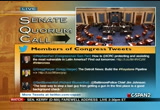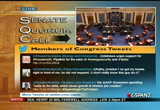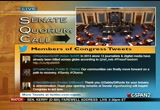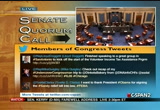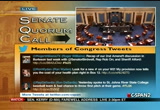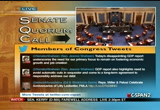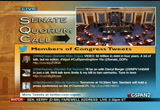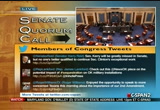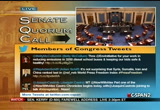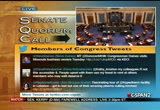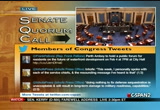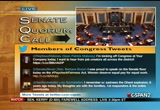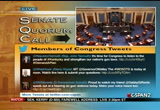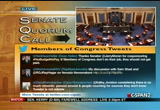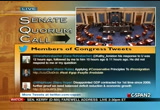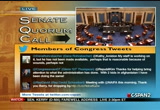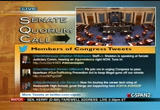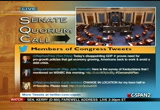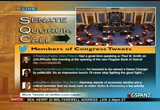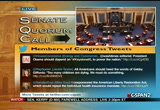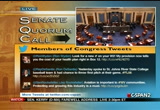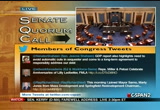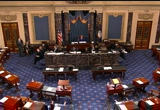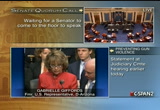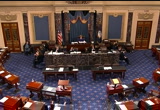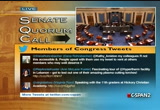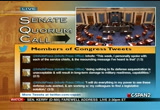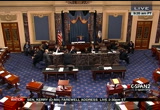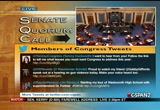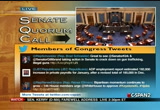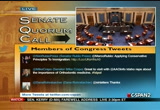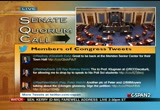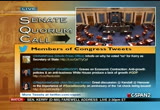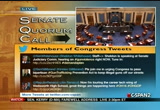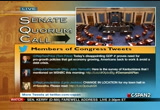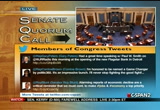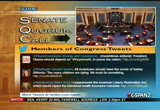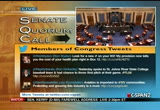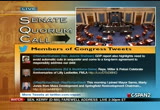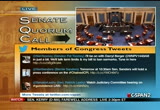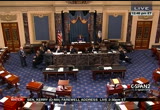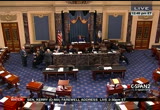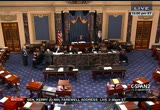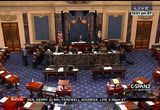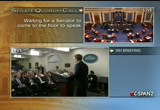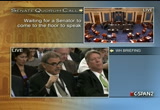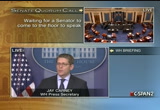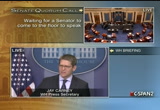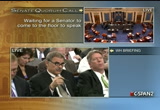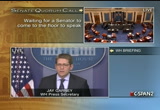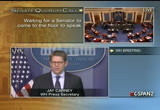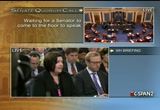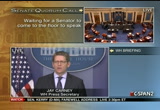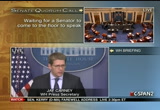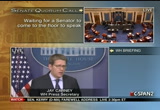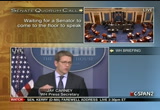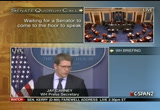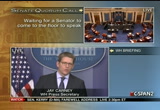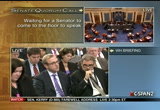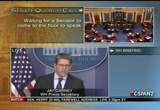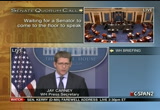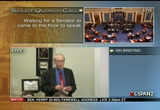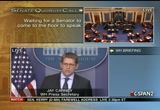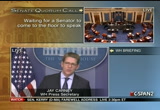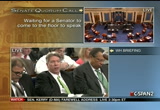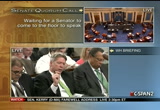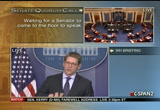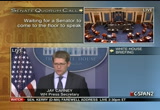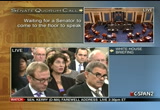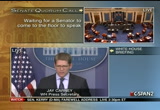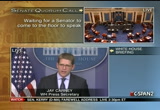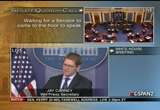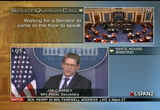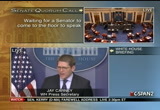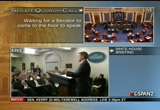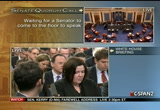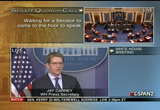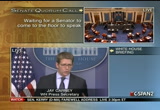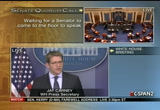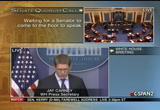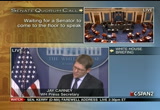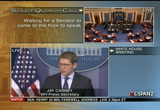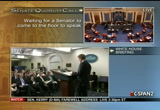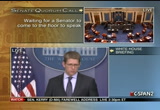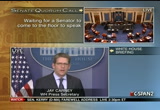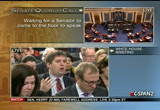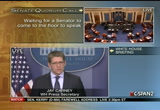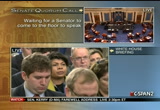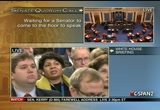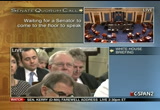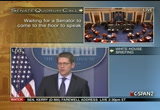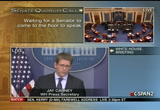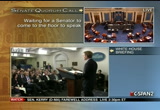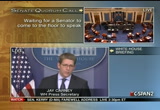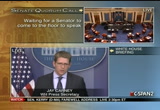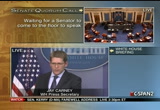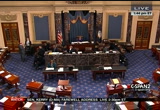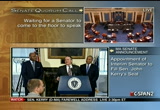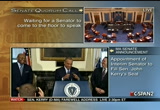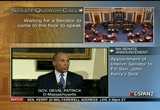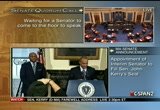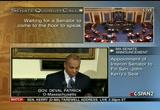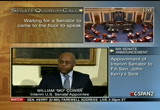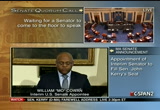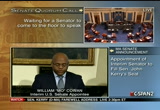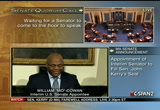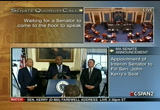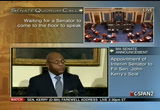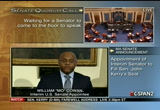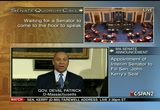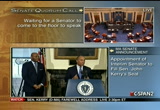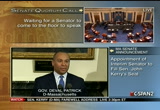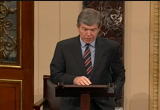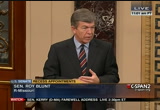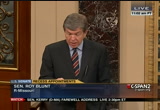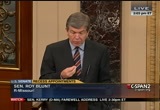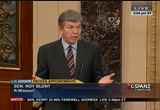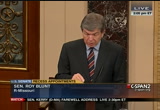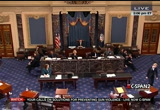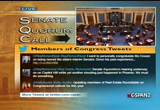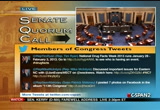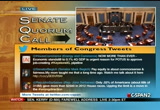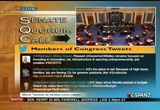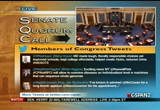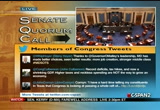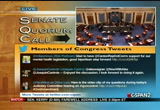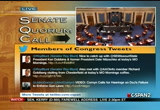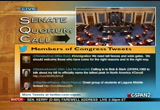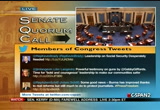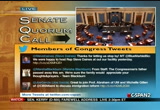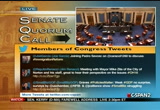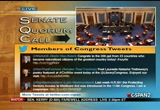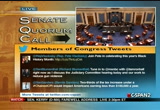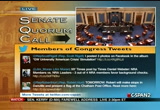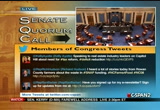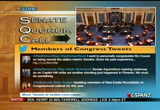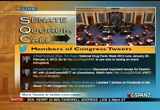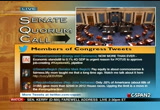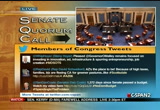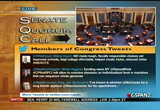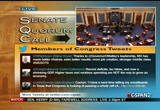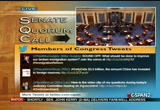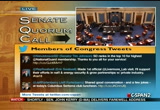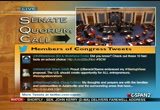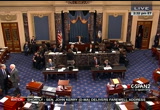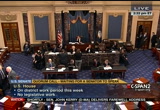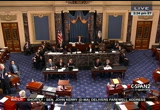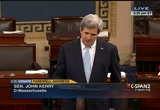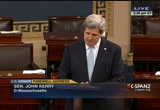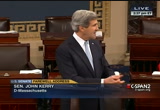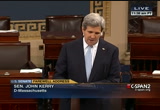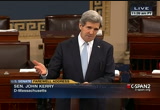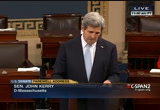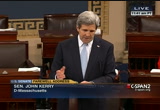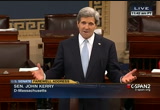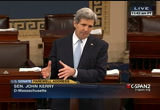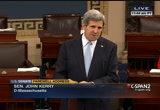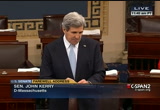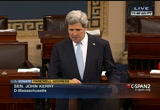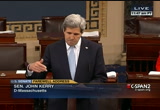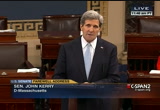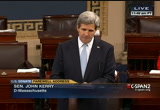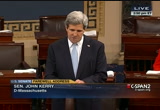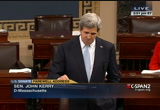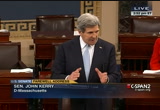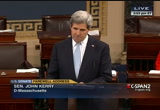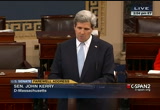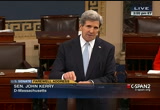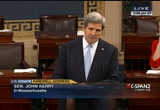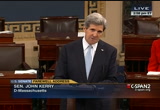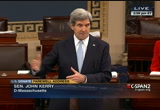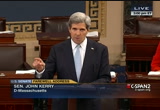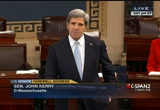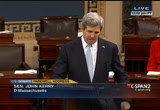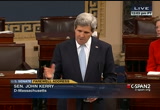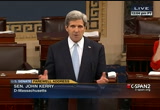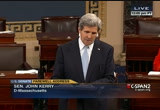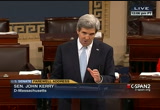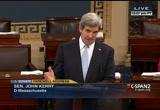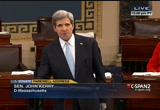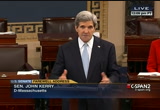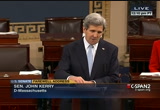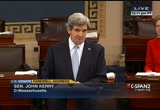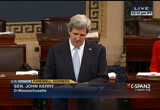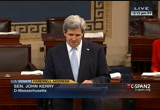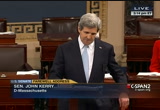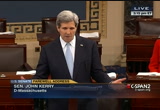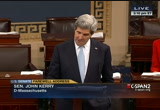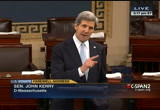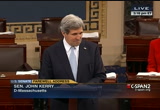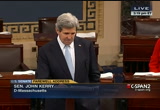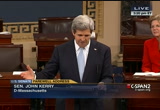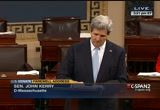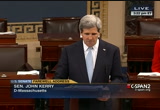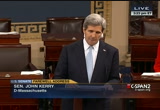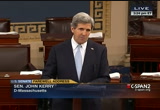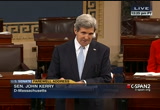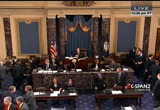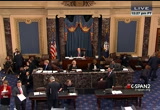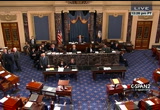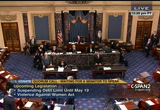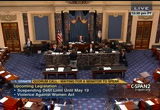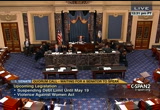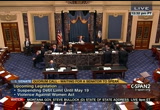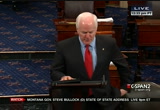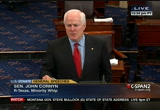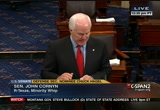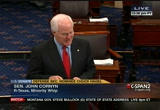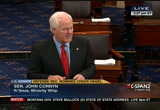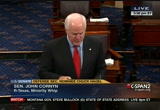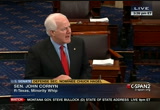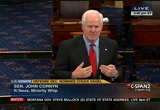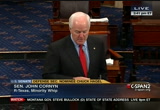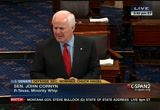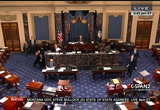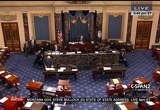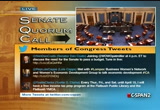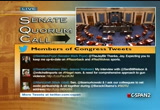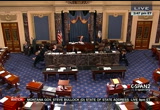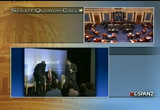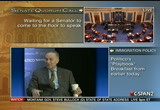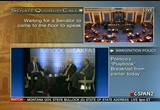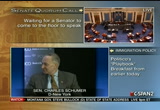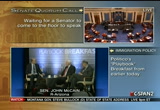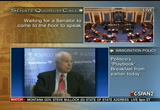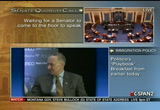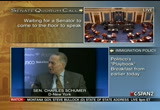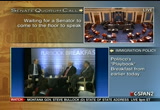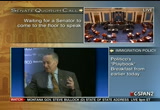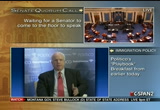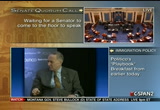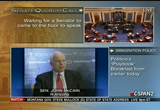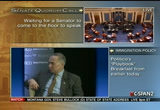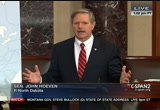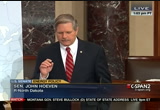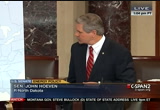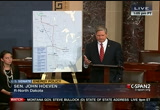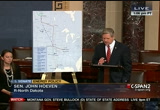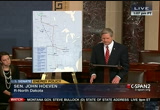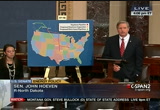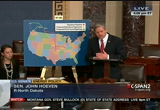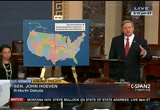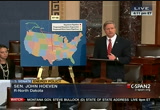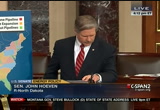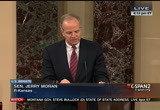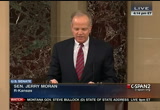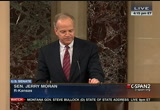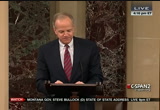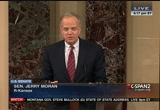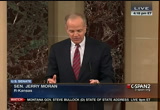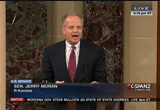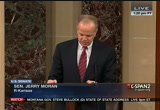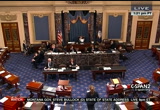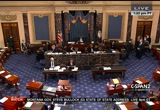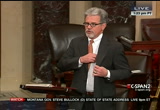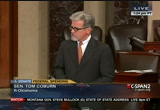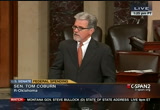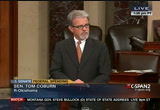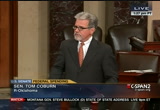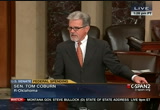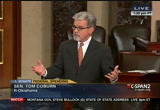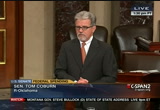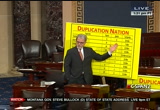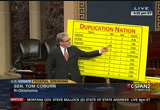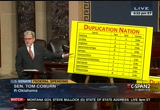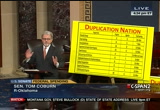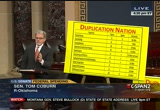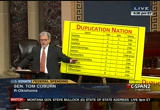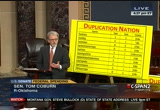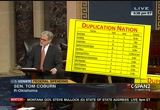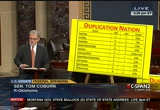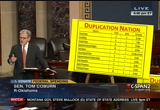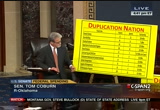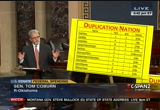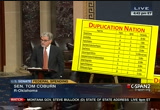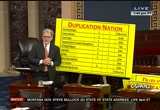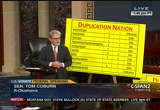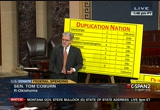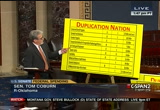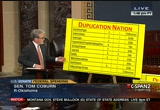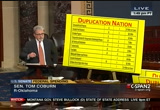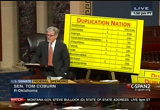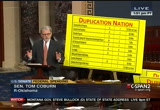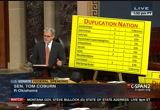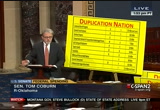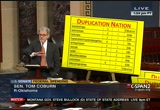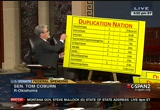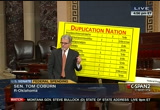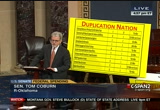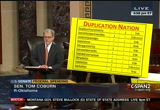tv U.S. Senate CSPAN January 30, 2013 12:00pm-5:00pm EST
12:00 pm
truck that they can sell directly to criminals. it's shocking to me as a mother. it's shocking to me as a lawmaker. but this is something we can actually fix. over the past three years, more than 33,000 guns used in violent crimes showed telltale signs of black market trafficking. 420,000 firearms were stolen and thousands of guns with obliterated serial numbers were uncovered by law enforcement. so while law enforcement is working overtime to track down illegal guns and apprehend those who traffic these weapons, current law restricts their ability to investigate and prosecute these crimes. we can all agree this simply makes no sense and leaves all of our communities vulnerable. i am very proud to have worked with my colleague and friend, senator mark kirk, to introduce
12:01 pm
a bipartisan bill today, senate bill 179. this bill takes on the problem of gun trafficking head on. our bipartisan bill would empower local, state and federal law enforcement to investigate and prosecute gun traffickers, straw purchasers and their entire criminal networks. our bill does nothing to affect the constitutionally protected rights of responsible law-abiding gun owners. by cracking down on illegal trafficking and their vast criminal networks, we can stop the flow of these illegal guns that are coming into our city neighborhoods and reduce the gun violence. law enforcement officials across the country have said that they need this legislation to be able to fight crime. i urge my colleagues to support this bill, and i urge passage of this commonsense nonpartisan,
12:02 pm
bipartisan piece of legislation. i would also like to now submit a statement for the record that senator mark kirk has authored. i'd like to appear following my statement. the presiding officer: without objection. mrs. gillibrand: i suggest there's an absence of a quorum. the presiding officer: the clerk will call the roll. quorum call:
2:00 pm
the presiding officer: the senator from missouri. a senator: i move we suspend the quorum call. the presiding officer: without objection. mr. blunt: i have a piece of legislation i intend to introduce, the advise and -- consent protection act. senator cruz and i will be introducing this bill that really responds to last week's decision announced on friday by a three-judge panel on the d.c.
2:01 pm
circuit court of appeals where they unanimously ruled that president obama violated the constitution when he made so-called recess appointments to the national labor relations board, and they're so-called recess appointments because the senate said we were still in session. the fundamental question here is: does the president get to decide whether the senate's in session or not or does the senate get to decide whether the senate's in session or not? if that question would have been debated when the constitution was being debated, i'm sure that they would say, well, that will never come up. there's no -- no way we're going to develop a system with this balance of separation of powers and the president will decide whether the senate is in session or not. but this president did decide that and the court agreed with the argument that a number of senators, senator mcconnell and i, along with 40 of our
2:02 pm
colleagues, filed an amicus brief that clearly made the pointed that the senate gets to decide -- made the point that the senate gets to decide when the senate is in session. we argued that the constitution does not empower the president to make this decision. the court agreed with that ruling stating that "any other interpretation of the constitution would give the president free rein to appoint his desired follow knees any time he pleases" -- this is a quote from the court. the court said -- quote -- "the president would have free rein to appoint his desired nominees at any time he pleases, whether that time be a weekend, lunch or even when the senate is in session and he is merely displeased with its inaction." that ends the quote out of the three-judge panel's decision. the right of the senate to
2:03 pm
provide advice and consent is an important check on the risk of this type of presidential overreach. and one that the senate should actively exercise. and, in fact, the senate actively and consciously made the decision in january to stay in session to do some of the work that needed to be done during the session and, frankly, to be sure that the president couldn't avoid the constitutional requirement of advice and consent. following the president -- allowing the president to determine the senate's schedule would seriously damage the -- the balance of powers, it would seriously damage the senate's autonomy. it eliminates an important check on the executive branch. the court invalidated the one ruling that was being appealed. mr. president, you, of course, understand this exactly. the court case would only have
2:04 pm
appealed one ruling that impacted one company or one employer and the court said that ruling can't stand. but there are more than 200 other actions that this same group that the court said is not legally functioning had taken and all 200 or more of those actions are now in question. i believe the answer will be clear. perhaps all those will have to be appealed in some way so that a court can say, no, just like the first ruling we made, the people that made these decisions were not constitutionally in place. consequently, the ruling they made isn't in place. i believe the answer here will be clear. the work of this agency will not pass constitutional muster. and, of course, the president needs to now appoint people that would be confirmed by the -- by
2:05 pm
the senate. in spite of the three-judge panel's unanimous decision, the national labor relations board recently announced that it intends to ignore the ruling and carry on with business as usual. well, this is not a very acceptable response. the president first decides he's going to decide whether the senate's in session or not and then the people he appoints in an unconstitutional way decide they're going to ignore the court ruling and continue to do what they've been doing. well, the president needs to reappoint, and until the president does reappoint, congress has a responsibility to block this unconstitutional act by terminating the salaries of those who were illegally appointed and by preventing them from conducting any official business until the senate acts to approve their appointments. senator cruz and i urge our colleagues to join us in supporting this effort.
2:06 pm
the national labor relations board should take down the "open for business" sign that they put up on monday after the court ruling on friday, and, frankly, they need to put up a "help wanted" sign. the constitution matters. what the constitution says matters. and the senate should and i hope will be vigorous in enforcing our constitutional responsibility. and with that, mr. president, i notice the lack of a quorum. the presiding officer: the clerk will call the roll. quorum call:
2:34 pm
2:35 pm
ferrar the presiding officer: the senate is in 00 quorum call. mr. kerry: mr. president, i apologize. you'd think i would have learned that by now. [laughter] mr. kerry: i ask that the quorum call be dispensed with. the presiding officer: without objection. mr. kerry: mr. president, you can see where my focus is. i want to begin by thanking my colleagues, all of them, for their unbelievably generous comments to me personally in the committee and on the floor and in the halls and in meetings over the course of the last weeks. i will always be grateful for our friendships, and i thank my wife teresa who is here sitting in the family gallery and my entire family for their unbelievable support through this journey. five times massachusetts has voted to send me to the united states senate. yesterday nearly three decades after the people of massachusetts first voted me into this office, the people i work with in the senate voted me
2:36 pm
out of it. as always, i accept the senate's sound judgment. eight years ago i admit that i had a very different plan, slightly different anyway, to leave the senate but 61 million americans voted that they wanted me to stay here with you. and so staying here i learned about humility and i learned that sometimes the greatest lesson in life comes not from victory but from dusting yourself off after a defeat and starting over when you get knocked down. i was reminded throughout this journey that something that's often said but not always fully appreciated -- all of us senators are only as good as our staff, a staff that gives up their late nights and weekends, postpones vacations, doesn't get home in time to tuck children into bed. all of those lost moments
2:37 pm
because they're here helping us serve. they're not elected, they didn't get into public life -- public service to get rich, that's for sure, and their names are rarely in the newspapers. but from the staff in the mailrooms to the people who answer the front phones, to the policy experts and the managers, the legislative correspondents who write the election the caseworkers who make government accountable and the people everywhere in between, they make the senate work for people. i have been blessed to have a spectacular staff and while i know every one of my colleagues would say the same thing about their staffs, it is true about mine. if i start naming names, i'm going to miss somebody, so i'm not going to. but i think everyone on my staff will understand why i want to acknowledge five who are not with us any longer. they're up in heaven looking down on all of you and ted kennedy has probably drafted all
2:38 pm
of them, joanna, bill bradley, jean heller, the latter two of whom were senior citizen volunteers from my boston office who opened our mail for over a decade, not paid, they just did this out of their love of country. we miss them all and we thank them for their selfless contribution. as i do, an entire staff of 561 incredible men and women in massachusetts and washington that i've been believed to work with through these 28 years. i also think about the interns -- 1,39 p who have come oust our offices from washington to worcester and i am especially proud of those who started as interns and ended up as my chief of staff, a legislative director, senior policy staffers, or the kerry interns who went on to work not just for
2:39 pm
me but who have for the last four years been top speechwriters, trip directors, senior communications staff at the white house for the president of the united states. i'm proud of our internship program, and i'm grateful to the people who built it and who sustain it. i also want to thank the incredible group of unsung heroes who literally make the senate work, people who work not for individual senators but work for all of us in every room and nook and cranny of this great series of buildings, the men and women who operate the senate subways -- darryl, and many others -- the trains, the he verities, they take -- the elevators, they take us to the meetings. they are the glue. we couldn't function without them. they are an extraordinary group of people. the capitol police who protect us. the police who a lot of people started to notice a little bit more after that awful day in 1998 when two were shot and
2:40 pm
killed on a bus did i wednesday after-- wednesday afternoon. the parliament starns and staff on the floor, including garry and tim and tricia and meredith and all the folks in the cloakroom and all the folks in the republican cloakroom, all of whom are unfailingly patient when we call for the umpteenth time to find out when the vote schedule will how us to get home to a child's birthday party or any kind of family event. i want to thank the many birdie bowmans who came here nearly 40 years ago and made the senate their cause and their concern. people like meg murphy of the foreign relations committee who makes everybody's life easier. and i thank the reporters who catch us in the hallways, trap us, ambush us in the hallways, and who despite all the changes and challenges in their own business still dutifully
2:41 pm
document the first drafts of american history. i thank all the incredible people who travel through threes halls working incredibly hard to get it right, people of characteristic who cover this place as a public is i not a sport, and i thank them. i thank david rogers for all that he has stood for sloth in this us -- so long in this institution. it is hard to imagine my job without seeing him in that long green coat waiting by the elevator after a late-night vote. sometimes in politics it's now almost a sport in america to dismiss the contributions of people who work in government, people who make the senate work but people that the senate never see. i have admired the way our former colleague ted kaufman used to come down to the floor once a week and tell the story of one individual federal worker. the stories are legion. instead of tearing these people down, we ought to be lifting
2:42 pm
them up, and i thank them all for the part that they play in our democracy. i will share with you now that i've come to this moment in the journey, i can say, without reservation that nothing prepares you for it. many times now in 29 years i've been at my desk here on the floor starting way over there, number 99, listening as colleagues bid the senate farewell. sometimes a farewell speech signals a complete departure from public life. sometimes a new journey altogether. sometimes forced departure. sometimes a leap for freedom. i'm grateful that at this momentings thanks tmoment, than, serendipity and trust of our president, while i am closing a chapter, it is not the final one. i assure you, amidst the excitement and possibility, i do
2:43 pm
feel a wistfulness about leaving the united states senate. that's because despite the obvious frustrations of recent days and years, a frustration that we all share, this place remains one of the most extraordinary institutions of any kind on the face of the earth. on occasion we have all heard a senator leave here and take their leave condemning the senate for being broken, for having become an impossible setting in which to try to do the people's business. well, i want to be very clear about my feelings. i do not believe the senate is broken, certainly not as an institution. there's nothing wrong with the senate that can't be fixed by what's right about the senate. the predominant and weighty notion that 100 american citizens chosen by their neighbors to serve from states as different as massachusetts and montana can always choose to
2:44 pm
put parochial or personal interests aside and find the national interest. i believe it is the honor of a lifetime, an extraordinary privilege, to have represented the commonwealth of massachusetts in the united states senate for more than 28 years. what a remarkable gift it has been to carry the banner of senator from massachusetts, just as each of you feel that way about your states. a banner in our case that was passed from the sons of the american revolution like daniel webster to the sons of immigrants like paul tsongas and to know that a state where the apoll listingisted crusaded and the sufficient fro jets marched could send to washington sons like ted kennedy and ed brook who fought to expand civil rights and now a woman, elizabeth warren, who proved that in massachusetts the grat ceiling has finally been forever
2:45 pm
shattered. and what a remarkable gift massachusetts has given me to come here and learn so much about the rest of our country. i've had the privilege of learning what really makes our nation tick. what a gift to have been the nominee of my party, to have come within a whisper of winning the presidency against a wartime incumbent, but more importantly to have experienced the magic of our nation in such a personal way, to experience the gift of traveling along the banks of the mighty mississippi through iowa and south dakota and along the rivers where lewis and clark marked and measured the dream of our first secretary of state, thomas jefferson, who foresaw an america that would advance into the west, to experience a journey that took me to alabama where i stood silently in the
2:46 pm
very pulpit from which dr. king preached his dream of an america united and dipped my fingers into the fountain into birmingham where water flows over the names of those murdered trying to vote or just registering to vote, to see the water trickle over the words of dr. king's prayer that justice might roll down like waters and righteousness like a mighty stream. i drove across the hoover dam and i wondered as i did at what america can accomplish when we want to, when we put our minds to it. driving across the golden gate bridge at dawn and reminded that it was built at the height of the great depression when so many feared that our best days were behind us. what i have seen and heard and learned in traveling across our country as a senator from massachusetts has prepared me more for my travels to other countries as secretary of state
2:47 pm
than any travel to any foreign capital. i already know that i will miss the best reward of carrying the title of senator, and that's when you open a letter from someone who has traveled every route and exhausted every option and who ultimately turned to you as the last resort in public life, and they finally got the help they needed. i know my colleagues who have experienced this will say there is nothing better than getting the i have tried everything but nobody would listen to me but you got it done letter. or sometimes when you're walking a street in a community at home and someone comes up to you and thanks you for a personal response that they never expected to receive. that's when public service has more meaning than the war of words our constituents dodge on the cable news. standing here at this desk that once belonged -- at this desk
2:48 pm
that once belonged to president kennedy and to ted kennedy, i can't help but be reminded that even our nation's greatest leaders and all the rest of us are merely temporary workers. i'm remind thad this chamber is a living museum -- reminded that this chamber is a living museum, a lasting memorial to the miracle of the american experiment. no one has captured this phenomenon more eloquently or comprehensively than robert carrow did in his masterpiece about the senate called "master of the senate." i'm sure many in this room, i know most people have read it. in that book before we learned of the levers that lyndon johnson pulled to push our nation toward civil rights, carroll described the special
2:49 pm
powers that the founders gave the senate and only the senate, powers carroll writes designed to make the congress independent of the president and to restrain and act as a check on his authority, power to approve his appointments, even the appointments he made within his own administration, even the appointments to his own cabinet. this body has now exercised that power on my behalf, and i will always be grateful. another master of the senate, massachusetts' daniel webster, delivered 183 years ago this week what has often been praised as the greatest speech in senate history. he stood at the desk that now belongs to the senior senator from new hampshire and argued forcefully in favor of the very idea that makes us the united states. that we're all in this together, that we each have a stake in the successes and failures of our countrymen, that what happens in ohio matters to those in south
2:50 pm
carolina or in massachusetts or to montanans. union and liberty, webster shouted, now and forever one and inseparable. as caro retells it, those words spoken among the desks in the senate left those in the gallery in tears and cast a model for how those of us in this chamber must consider the constituents of our colleagues as well as our own, but the truth is that none of us ran for this office because of a great debate held centuries ago. none of us moved here because of the moving words of the senator long since departed. we honor this history because we're here because of the legacy that we can and want to leave. it's up to us. to my colleagues here today and to those who come after us, it's up to us to keep the senate great.
2:51 pm
i fully believe that we'll meet that obligation if, as the president told the nation and the world last week, we seize this moment together. yes, congress in public life face their difficulties these days, but not because of the structure that our founding fathers gave us is inherently flawed. for sure, there are moments of great us from -- frustration, for the american people and for everybody in this place, but i don't believe that they are the fault of the institution itself. it's not the rules that confound us per se. it's the choices people make about those rules. the rules we work by now are essentially the same ones that existed when i joined the senate and found things to move much more easily than they do today. they are essentially the same rules under which daniel webster and lyndon johnson operated, and they did great things. they are almost the same rules
2:52 pm
that mike mansfield and everett dirksen and ted kennedy and orrin hatch used to pass great pieces of legislation. they have the same rules under which the senate democrats and president george herbert walker bush passed an agreement, including tax increases, to at last begin to tackle the deficit. and i remind everyone here as i take my leave from the senate, when president george h.w. bush returned from agreeing to a deficit reduction agreement at andrews air force base, he wrote in his personal diary that he might well have sealed his fate as a one-term president. he did what he thought was right for the country and he laid the groundwork for our ability to three times balance the budget at the end of the 1990's. that's courage, and the senate and the congress and the country need more of it.
2:53 pm
frankly, the problems that we live through today come from individual choices of senators themselves, not the rules. when an individual senator or a colludeing caucus determine that the comity essential to an institution like the senate is a barrier to individual ambition or party ambition, the country loses. those are the moments in which the senate fulfills not its responsibility to the people but its reputation as a sanctuary of gridlock. i ask colleagues to remember the words of ben franklin as that long philadelphia summer yielded our markable constitution. late at night after their work was complete, dr. franklin was walking down the steps of constitution hall, of independence hall, and a woman called out to him and she said well, doctor, what have we got,
2:54 pm
a republic or a monarchy? franklin answered a republic, if you can keep it. sustaining a functioning republic is work, and it's more than ever, i believe, our challenge today. i am hardly the first -- and i will, i hope, probably not be the last, to call on congress to remember why we're here, to prioritize our shared interests above the short term, to bridge the breadth of the partisan divide, and to reach across the aisle and take the long view. many have stood here delivering farewell speeches and lamented what became of the washington where president reagan and speaker o'neill could cultivate an affiliation stronger than party or a congress that saw true friendships between senators like kennedy and hatch, inouye and stevens, obama and coburn. the odd couples, as they have
2:55 pm
been dubbed. i can't tell you why, but i do think that it is possible this moment may see a turn in the spirit of the senate. there are new whispers of desire for progress, rumors of new coalitions and a sense of possibility, whether it is on energy or immigration. i am deeply impressed by a new generation of senators who seem to have come here determined not to give in to the cynicism but to get the people's business done. i am confident that when today's freshmen take their turns in leaving the senate, they will be able to tell of new senators added to that inhe is estimatable list -- inestimatable list of odd couples, and with any luck by them it will not be odd. so i leave here convinced that we can keep our republic strong.
2:56 pm
when president kennedy observed, i quote him -- "our problems are man made. therefore, they can be solved by man, "he was talking about a much more literal kind of nuclear option than the euphemism we use today to discuss senate rules, but his vision is just as important for us to recognize in our time, whether we're talking about the ability of senators to debate and vote or about the issues on which they do so. it is still true today, as he said 50 years ago, that reason and spirit have often solved the seemingly unsolvable, and we believe, he said, they can do it again. i believe that, too. so what effort do we need to put into our reason and spirit in order to do it? well, i believe there are three most significant challenges that have conspired to bring about a
2:57 pm
dangerous but a reversible erosion in the quality of our democracy. the decline of comity, the deluge of money and the disregard for facts. first, i have witnessed what we all have, a loss of simple comity, the respect that we owe one another and the sense of common cause that brings all of us here. the senate as a body can change its rules to make itself more efficient, sure, but only senators, one by one in their own hearts, can change the approach to legislating which henry clay correctly defined as the art of consensus. i came to the senate in 1985 as a member of a hopeful and hard-charging class of freshmen. paul simon, tom harkin, al gore, phil gramm, jay rockefeller and i all have at least three things
2:58 pm
in common. we were all sworn in as senators at the same time. we each explored running or ran for the white house. and none of us made it there. the last remaining member of that class, senator mitch mcconnell, has now again been elevated by his peers as the republican leader. i see a lot of a very similar aspiration to what we felt when i came here in 1985 in today's freshmen and sophomores. many came to the senate running on the premise that it's broken beyond repair. i encourage each and every one of them to reject that premise in order to restore the promise of the senate. the senate cannot break unless we let it. after all, the value of this institution, like any instrument of power, is how you use it, but we can't ignore the fact that today treaties that only a few years ago would have passed 100-
2:59 pm
0 don't pass at all. people that want to vote for something that they believe in actually don't do so for fear of retribution. that is a reflection on all of us, and as i prepare to represent our nation in capitals around the world, i am more than conscious that my credibility as a diplomat and ours as a country is determined to a great degree by what happens right here in our own capital city. the antidote to the current narrative of american decline. and you will hear it, in china, in iran, in other parts of the world. the antidote to that -- and it is rushed by rival countries -- is to demonstrate that we can get our economic house in order because we can be no stronger abroad than we are here at home.
3:00 pm
it's that simple. the unwillingness of some to yield to the national interests is damaging to america's prospects in the world. we are quick to talk about the global economy and about global competition, but it's our own procrastination and outright avoidance of obvious choices that threatens our own future. other nations are both quick and glad to fill the vacuum that's brought about by our inaction. if the senate favors inaction over courage and gimmicks over common ground, the risk is not that we will fail to move forward, it is that we will fall behind, we will stay behind, and we will surrender our promise to those who are more than willing to turn over our squandered opportunity into their advantage. the world keeps turning. the senate cannot afford to forever stand still.
3:01 pm
and just as failing to deal with our deficit and our debt puts our long-term interests at risk, so does taking america to the brink of default. our self-inflicted wounds reduce our leverage and our influence in the world. and by failing to act, congress is making it harder to actually advance america's interests and making it harder for american business to compete and for american workers to succeed. if america is to continue to lead the free world, this must end. now, we've all bemoaned the lack of comity in the senate. those of you who remain here will have the power to restore it, the choice to work respectfully with one another is about as simple as it gets. one suggestion, perhaps, while i'm honored by the presence of so many colleagues here now -- republicans, democrats -- i have to say that we would all look forward to more days when united
3:02 pm
states senate desks are full with senators debating and deliberating, learning and listening and leading. we would all be stronger if this chamber is once again crowded because it is the world's greatest deliberative body and is the home of debate and deliberation, not only when it comes a departure lounge. there's another challenge that we must address and it is the corrupting force of the vast sums of money necessary to run for office. the unending chase for money i believe threatens to steal our democracy itself. i've used the word "corrupting" and i want to be very clear about it. i mean by it not the corruption of individuals but a corruption of a system itself that all of us are forced to participate in against our will. the alliance of money and the interests that it represents,
3:03 pm
the access that it affords to those who have it at the expense of those who don't, the agenda that it changes or sets by virtue of its power is steadily silencing the voice of the vast majority of americans who have a much harder time competing or who can't compete at all. the insidious intention of that money is to set the agenda, change the agenda, block the agenda, define the agenda of washington. how else could we possibly have a u.s. tax code of su of some 70 pages? ask yourselves how many americans have their own page, their own tax break, their own self deal? -- their own special deal? we should not resign ourselves, mr. president, to a distorted system that corrodes our democracy, and this is what is contributing to the justifiable
3:04 pm
anger of the american people. they know it. they know we know it. and yet nothing happens. the truth requires that we call the corrosion of money in politics what it is -- it is a form of corruption and it muzzles more americans than it empowers, and it is an imbalance that the world has taught us can only sow the seeds of unrest. like the question of comity in the senate, the influence of money in our politics also influences our credibility around the world. and so, too, does the difficul difficulty, the unacceptable and extraordinary difficulty we have in 2013 operating the machinery of our own democracy here at home. how extraordinary and how diminishing that more than 40 years after the voting rights act, so many of our fellow citizens still have great difficulty when they show up on election day to cast their vote and have their voice heard. that, too, is an issue that
3:05 pm
matters to all of us, because for a country that can and should extol the virtues of democracy around the world, our job is made more difficult when, through long lines and overt voter suppression and efforts to suppress people's ability to exercise the right that we ext extol, so many struggle still to exercise that right here at home. the last of the three obstacles we have the ability if the will to overcome is the unbelievable disregard for facts, for science in the conduct of our affairs. it, like the first two, degrades our credibility abroad as well as at home. my friends, the persistent shouting match of the perpetual campaign, one that takes place in parallel universes thanks to our polarized self-selecting media, to some degree, makes it harder and harder to build consensus among people.
3:06 pm
the people don't know what to believe. and so in many ways, it encourages an oversimplification of problems that too often retreat to slogans, not ideas for real solutions. america, i regret to say, is increasingly defaulting rather than choosing, and so we fail to keep pace with other nations in the renewal of our infrastructure, in the improvement of our schools, in the choice of our energy sources, in the care and nurturing of our children, in the fulfillment of our god-given responsibility to protect life here on earth. that, too, must change or our experiment is at risk. to remain a great nation, we must do the business of our country and that begins by putting our economic house in order. and it begins by working from the same set of facts. though i believe we can't solve any of these problems unless you
3:07 pm
really solve all of them, i note these three challenges because i believe the senate is going to be locked into stalemate or our politics are going to be irreversibly poisoned unless we break out. i do so today and say this hopefully, as someone who respects and loves this institution and loves this country and wants to see us move forward. some things we know are moving forward. in the same time that comity has decreased and the influence of money has increased, i have seen the senate change for the bett better. this chamber used to be filled with the voices of men and men only. decisions affecting more than half the population were made by people representing the other half. when i walked into the senate chamber to take my first oath 28 years ago, i was joined by my two teenaged daughters. it struck me. i have twice as many daughters
3:08 pm
as there were women in the united states senate. and today, with the service of 20 women, including massachusetts' new junior senator, this is a stronger, smarter place, more representative of our belief that out of many, we are one, more capable of fulfilling the vision carried from washington to webster to our current president that we are stronge stronger -- we are a stronger nation when our leadership reflects our population. we have made huge strides on turning a page on gay rights. in 1993 i testified before strom thurmond's armed services committee pushing to lift the ban on gays serving in the military. and i ran into a world of misperceptions. i thought i was on a "saturday night live" skit. today, at last, that policy is gone forever and we are a country that honors the
3:09 pm
commitment of all willing to fight and die for our country. we've gone from a senate that passed doma over my objections to one that just welcomed its first openly gay senator. there are good changes that have taken place for our senate and for our country. but we have more work to do. this place needs more women, more people of color, more diversity of background and experience. but it's still a remarkable place. i am reminded of the letters of harry truman that he used to write home to his wife bess. he sat in the back row of the chamber. and late one night after the great debate of the new deal era, he wrote toes mother, "-- he wrote to his mother, "i hear my colleagues and i look out at them and i pinch myself and i ask 'how did i get here'" several months later he wrote bess once more, again it was late at night, he said, "i'm sitting here listening to the debate and i look across the aisle at my colleagues and i listen and i listen and i see my colleagues, and i ask myself:
3:10 pm
how did they get here anyway?" [laughter] well, i have no doubt that colleagues have asked that question about me or about any one of us. it's been back and forth. but 29 years later i have learned something about how you solve that. i learned that the senate runs on relationships. now, i know that some of my more recent colleagues sent here in tumultuous election cycles and they think that it's code for checking their beliefs at the door and going washington. it's not. and i'd add, don't kid yourself. no one got here on a platform of pledging to join an exclusive club and forget where they came from. when i say that relationships matter, i don't mean back slapping, gladhanding, hey fellow, well net, get along to go along relationships. i mean real relationships. and today's hard-charging colleagues who came to washington to shake things up,
3:11 pm
i'd remind them -- so did i, so did tom harkin and the others i mentioned. if i told you that a 40-year-old newly minted senator john kerry was going to tell you that relationships mattered most, i would have looked at you like you had three heads. i cut my teeth in grass-roots activism. didn't come up through the political -- i didn't come up through the political ranks. i burst on to the scene as an activist, and when you're an activist, all that singularly matters to you to the exclusion of almost everything else are the issues -- where you are on an issue, right or wrong and that's the ball game. wrong -- it's not the ball game. that's not what makes a good senator. and it's not what makes the senate work. my late colleague of 25 years, ted kennedy, taught me that. i saw him late at nights on the senate floor sitting with his colleagues talking, listening, wanted to know about your state, he wanted to know about your family, he wanted to know why you came here. he had a unique ability to know not just what he needed from you
3:12 pm
on a vote or a piece of legislation but to know what you needed on a personal level as a friend, as a colleague, as a partner. my old friend, now vice president joe biden, had a saying in his family -- if you have to ask, it's too late. with teddy, you never had to a ask, he always knew. and he was there. he was there on a foggy morning on nantucket when my father passed away, when teddy just materialized almost out of nowhere. and there he was at my porch door. he didn't call ahead. he didn't ask. he came just to mark the passage and he came to listen. he was there. it was an instinct for people and an impulse to help. he taught that to -- so many of us during that period of time, somewhere along the line he passed it on not just to me but to every colleague here who was privileged to work with him. i'll never forget in 2007 on the day when i announced that i wouldn't be running again for president, a rough day, another passage. i got a call that tom harkin
3:13 pm
wanted to come and see me. my staff surmised that he was probably come to ask for money for the iowa democratic party. [laughter] they were wrong. [laughter] it was a visit where tom just came to share a few words that were very simple but which meant the world to me. a colleague visiting just to say he was proud that i'd been the nominee of the party, you know, he looked forward to working with me more in this institution. let me tell you, those are the conversations that make the difference and those are the conversations you never forget. and that is the united states senate at its best, the place where relationships matter the most. and it matters because teddy and tom and so many others here understood instinctively that if a hundred senators really knew each other -- and our leader has worked very hard to try to find a way to make this happen -- then you can find the ways to work together. to my surprise, i learned it here in a way that i never could
3:14 pm
have predicted, alongside people i'd never thought i'd count as one of my proudest friends. john mccain last week introduced me at my confirmation hearing. john and i met here in the senate coming from very different positions and perspectives. we both love the navy. i still do to this day. but i have different feelings from john about a war. for both of us, vietnam was a demarcation point in our lives the way it was for so many of our generation. but here in the senate late one night on a codel -- for people listening who don't know, codel is a trip of senators, congressmen going somewhere in the world -- we were going to kuwait after the first gulf war. and john and i found ourselves on a c-130 sitting opposite each other, neither of us could sle sleep, so we talked. we talked late into the night about our lives and our war. shortly thereafter, george mitchell and bob dole threw us together on a select committee
3:15 pm
to investigate the fate of americans missing from the war in which we'd fought. it was a tough time, an emotional issue in an era where rambo was a box office smash and "newsweek" magazine cover printed provocative photos which asked whether americans were still alive over there. into that cacaphonous caldron, john mccain and i were thrown together. some were suspicious of both of us. but together we found common ground. i will never forget standing with john in the very cell in the hanoi hilton in which he spent a number of years of his life. just of two of us alone in the cell listening to him talk about that experience. and i will always be grateful for his partnership in helping to make real peace with vietnam by establishing the most significant process in the history of our country, or of any country, for the accounting for missing or dead in any war.
3:16 pm
and afterwards then working to lift the embargo and ultimately normalize relations with an old enemy. john had every reason to hate, but he didn't. we were able to heal deep wounds and end a war that divided an awful lot of people for much too long. that is a common experience, and only the relationships that are forged in the united states senate could have made that happen. john has this great expression: a fight not joined is a fight not enjoyed. he loves to debate. he loves to battle. and so do i. but i'll tell you, having fought beside him and having fought against him, it's a heck of a lot better and more fun to have john fighting alongside you. we still have differences. there's been a lot of newsprint that's been used up covering some of them. but i'll tell you what, we both care about the senate as an institution, and we both care about the country's leadership
3:17 pm
and the world, even when we see it differently. and we both know that at some point america's got to come together. we shared this common experience and we've seen a lot together. we both were able to travel the country as a presidential nominee for our party and both returned to the senate to carry on in a different way. few people know what that feels like. but just being by his side in hanoi made it impossible for me not to be overwhelmed by his sense of patriotism and his devotion to country. it meant something else. if you can stand on the kind of common ground that we found in the hanoi hilton, then finding common ground on issues here at home isn't hard at all. i will always thank john mccain for that lesson. one of the magical things about the senate is this amazing mix of people and how they can come
3:18 pm
together to make something happen. i have learned and been impressed by the experiences of every single one of my colleagues, and i honestly marvel at the reflection of each state's special character in the people that they send here. i have learned from all, from the fiery street-smart social worker from maryland from a down-to-earth, no-nonsense farmer from montana, from a principled conservative doctor from oklahoma, from an amazingly tenacious advocate for women and the environment who blazed a trail from pwhraobg lynn to ranch -- brooklyn to rancho mirage in the united states senate, to one who is committed to stand for violence and equality. from a cantankerous maverick and patriot and former prisoner of war from arizona, from a
3:19 pm
song-writing compassionate conservative from utah; from a fervent, gravel-voiced people's champion from ohio; from a soft-spoken loyal, medal of honor winner from hawaii who used to sit right here; from a college professor turned proud prairie populist and senate pied piper taken from us far too soon and far too quickly. from every member of the senate there are characteristics, passions, quirks and beliefs that bring this place alive and unite to make it the most extraordinary legislative body on earth. that's what i love about the senate. i love that instead of fighting against each other, bill frist, the former republican leader, and i were able to join forces to fight h.i.v. and aids around the globe and convince an unlikely conservative named jesse helms to support and pass a bill unanimously that saved millions of lives on our planet. that's what makes this place so special. instead of ignoring a freshman
3:20 pm
senator, chairman claiborne pell allowed me to pass my very first amendment to change our policy in the philippines. and so i found myself with dick lugar paired as senate election observers who helped expose the voter fraud of the marcos regime, ending a dictatorship and giving a nation of more than 90 million people the opportunity to know democracy again. that's what the senate can do, and that's what i love about it. instead of focusing on our different accents and opposite ideologies, jesse helms and i found that our concern for illegal drugs was greater than any political differences between us. and so jesse made it possible for an investigation to proceed and for the senate to expose the linkages between the contras in nicarauga and flow of drugs to american cities. that's what the senate can do. mr. president, the senate can still work if we learn from and listen to each other. two responsibilities that are like webster said about liberty
3:21 pm
and union, one and inseparable. so as i offer my final words on the senate floor, i remember that i came of age in the senate where freshman senators didn't speak that often. senators no longer hold their tongues through whole sessions of congress, and they shouldn't. their voices are just as valuable and their votes count just as much as the most tenured member of this body. but being heard by others does not exempt them from listening to others. i came to the national mall in 1971 with fellow veterans who wanted only to talk to our leaders about the war. president nixon tried to kick us off the mall, but we knocked on door after door on capitol hill, but too often couldn't get an audience of representatives. a precious few, including ted kennedy and hubert humphrey,
3:22 pm
came to where we were camped out and heard what we had to say. i saw firsthand that our political process works only when leaders are willing to listen to each other, but also to everyone else. that's how i first came to the senate. not with my vote, but with my voice. and that is why the end of my tenure here is in many ways a book end. 42 years ago i testified before senate fulbright's foreign relations committee about the realities of war in vietnam. it wasn't until last week that i would sit before that committee again, this time testifying in my own confirmation hearing. it completed a circle which i never could have imagined drawing, but one our founders surely did. that a citizen voicing his opinion about a matter of personal and national consequence could one day use that voice as a senator, as the chairman of that same committee before which he had once testified as a private citizen
3:23 pm
and then as the president's nominee for secretary of state. that is a fitting representation of what we mean when we talk about a government of the people, for the people, and by the people. in the decades between then and now this is what i've learned above all else: the privilege of being here is in being able to listen to your constituents. it is the people and their voices, much more than the marble buildings and the inevitable institutions they house that determine whether or not our democracy works. in my first appearance before the senate at the fulbright hearings, i began by saying i am not here as john kerry. i am here as one member of the group of 1,000, which is a small representation of a much larger group. i feel much the same way today as i leave. we are still symbols, representatives of the people who have given us the honor to speak and advocate and vote in their name, and that, as the
3:24 pm
bible says, is a charge to keep. one day the 99 other senators who continue on for now and soon to be 100 again in a few days, will also leave in their own turn, in your own turn. some by their own choosing and some by the people's. our time here is not meant to last forever. if we use the time to posture politically in washington, we weaken our position across the world. if democracy deadlocks here, we raise doubts about the democracy everywhere. if we do not in our deeds prove our own ideals, we undermine our security and the sacred mission as the best hope of earth. but if we do our jobs right, if we treat our colleagues with respect and build the relationships required to form consensus and find the courage to follow through on our promises of compromise, the work
3:25 pm
we do here will long endure. so let us in the senate or in the house be bigger than our own districts, our own states. let us in spirit and purpose be as big as the united states of america. let us stand for our beliefs that above all let us believe in our common history, our common destiny and our common obligation to love and lead this exceptional nation. they say that politics stops at the water's edge. that is obviously not always true. but if we care for our country, politics has its limits at home and abroad. as i leave here, i do so knowing that forever the senate will be in my soul and that our country is my cause and yours. i thank you all for your friendship and the privilege of serving with you. thank you.
3:27 pm
mr. leahy: mr. president? the presiding officer: the senator from vermont. mr. leahy: mr. president, i ask unanimous consent the period of morning business be extended until 4:00 p.m. with senators permitted to speak therein for up to ten minutes each. the presiding officer: without objection. mr. leahy: mr. president, i
3:28 pm
3:33 pm
mr. cornyn: mr. president, i'd ask unanimous consent that the quorum call be resippedded. the presiding officer: without objection sm. mr. cornyn: mr. president, the nomination of chuck hagel to be the next secretary of defense has already done damage to the united states' credibility in its attempt to deny iran a nuclear weapon. thus emboldening one of the most dangerous regimes in the middle east. to limit that damage, president obama should choose someone else to lead the pentagon. after all, the nebraska senator is the same person who has consistently opposed sanctions against iran. he's the same person who wanted washington to support iranian
3:34 pm
membership in the world trade organization. he's the same person who voted against designating the iranian ref fusiorevolutionary guard coa terrorist group at a time when it was orchestrating the murder of u.s. troops in iraq. he's the same person who refused to sign a letter asking the european union to labor hezbollah -- to label hezbollah as a terror group, even though it is so designated by the united states state department. he is the same person who urged president bush to offer iran -- quote -- "direct, uncondition l, and comprehensive talks." close quote. he's the same person who called for establishing a united states diplomatic mission in tehran. he's the same person who dismissed -- quote -- "a military strike against iran as -- quote -- "not a viecialtion
3:35 pm
feasible, responsible option." he's the same person who suggested that the united states might be able to live with a nuclear iran. during his years in this chamber, senator hagel's opposition to iran's sanctions placed him in a very, very small minority. for example, only one other senator had joined him in voting against sanctions in 2001 and only one other senate banking committee member ginned hi joind him i voting against a different package. senator hagel has no credibility on perhaps the biggest foreign policy challenge facing the obama administration's second term and on american national security interests in the middle east and around the world. consider how his nomination was interpreted by iranian journalists and government
3:36 pm
officials. a tehran-based propaganda network noted in satisfaction that senator hagel is known for his crit simple of washington anti-iran policies and has consistently opposed any plan to launch a military strike against iran. the point is not that we should be threatening military strikes against iran but to take this off the table entirely completely undercuts any diplomatic efforts we might take to deny iran a nuclear weapon. meanwhile, a spokesman for the iranian foreign minister responded to the hagel announcement by declaring -- quote -- "we hope that practical changes will be create in the u.s. foreign policy and that the u.s. officials will favor peace instead of warmongering." the iranians are claiming that we're the ones warmongering while they are building a nuclear weapon.
3:37 pm
just for good measure, thal jazeera web site wrote an article "obama defeats the lobby." is this the impression we want to give our applies to the middle east? is this how we encourage our friends to say we will be there to support our allies? is this the message we want to convey to our adversaries like iran who has threatened the annihilation of israel to wipe it off the map? unfortunately, that's the message that's conveyed by a nomination of senator hagel as secretary of defense. not only is senator hagel been a persistent critic of iran's sanctions, he's also displayed a stubborn hostility to america's closest middle eastern ally.
3:38 pm
in october 2000 shortly after yasser arafat launch a second intifada, 96 u.s. senators signed a letter to president clinton affirming their solidarity with israel. senator hagel was not among th them. six months later, after a relentless onslaught of palestinian terrorism, 87 senators signed a different letter asking president bush to initiate reassessment of our relationship with the palestinians. once again, senator hagel refused to sign. he also refused to join 89 other senators in signing a 2001 -- november 2001 letter that urged president bush to maintain strong support for israel and to continue snubbing arafat until the palestinian leader ended his terror campaign.
3:39 pm
on april 12, 2002, a palestinian suicide bomber killed six people and injured more than 100 ears in jerusalem. that same day senator hagel went to the senate floor and suggested a moral equivalence between palestinian terrorism and israeli self-defense. three months later, he published an article in the "washington post" bemoaning the endless cycle of violence and declaring that israel must take steps to show its commitment to peace. in a 2003 interview with the local newspaper in lincoln, nebraska, senator hagel ratche ratcheted up his rhetoric even further saying the israelis keep palestinians caged up like animals. in 2009, senator hagel
3:40 pm
coauthored a policy paper that advised president obama to pursue a dialogue with hamas. again, a state department-designated terrorist organization with iran as their primary -- iran's primary proxy in the area. more specifically, the paper recommended that washington -- quote -- "offer hamas inducements that will enable it to be more moderate -- its more momoderate elements to prevail." most of us believe, including the united states state department, that hamas' views and behavior are already clear enough. it's committed to the annihilation of i israel. it fires rockets and iranian-made missiles at civilian areas. it indoctrine nates palestinian
3:41 pm
children in a culture of hatred and violence. of course, senator hagel's most famous comments -- i should say infamous comments on israel were delivered during a 2006 interview with former clinton administration official aaron david millerment in tha miller. senator hagel said "the jewish lobby intimidates a lot of people up here." these remarks are deeply offensive. but they're also quite revealing, for they confirm that he simply does not understand the true basis of the u.s.-israel alliance. the american people and their elected representatives support israel for obvious reasons. both of our countries are pluriistic democracies with a shared commitment to liberty,
3:42 pm
equality, and basic human rights. both of our countries are threatened by radical islam. and both of our countries have responded to that threat while remaining free and open societies. in other words, we have an alliance based on shared values and a common determineation to defend -- determination to defend liberal democracy against terrorists and dictators alike. i realize that senator hagel is now rue piewdiating many -- repudiating many of his past actions ages statements. but we've seen this before, individuals approaching the confirmation process, undergoing a seeming transformation. but this sudden and convenient transformation beggars belief. thisenator hagel has not underge an abrupt ideological makeover.
3:43 pm
4:01 pm
4:02 pm
call be suspended. the presiding officer: without objection. mr. hoeven: also, mr. president, i ask unanimous consent that the period of morning business be extended until 5:00 p.m. with senators to speak therein for up to ten minutes each. the presiding officer: without objection. mr. hoeven: thank you, mr. president. i rise today to advocate for a severe energy future for our nation. there's no question that we can achieve energy security or energy independence for our country and i believe we can do it in the next five years. i define energy security or energy independence as producing more energy than we consume. i mean, this is an interrelated, high-tech global economy. energy will move back and forth between nations but we truly become energy secure when we produce more energy than we consume. but to do that, to achieve energy independence or energy security, we must take the commonsense steps necessary to
4:03 pm
achieve it. that is why today once again i call on froam approv -- call ona to approve once again the keystone pipeline project. now that governor hineman of nebraska has approved the new route through his state of nebraska. the keystone x.l. pipeline is not just about bringing canadian oil to united states refineries. it is also vital to move our own u.s. produced oil to our refineries. in fact, that's how i got involved with this project in the first place. though it's hard to believe, trans-canada first applied for approval of this project 4 1/2 years ago. let me repeat that, 4 1/2 years ago. at that time, i, i was governorf north dakota and i was working with governor brian schweitzer, governor of montana, to make sure that oil producers in the
4:04 pm
bakken regions of our state can put light, sweet crude oil from the bakken area to the keystone x.l. pipeline. we met with trans-canada. we got our oil producers together, we met with trans-canada and they agreed. trans-canada agreed to an on-ramp so that the keystone x.l. pipeline would move north dakota and montana light sweet crude from the bakken to refineries throughout the united states, to refineries in illinois and texas, in oklahoma and in louisiana. hundreds of thousands of barrels of oil from our oil fields day one. and that's what this chart shows. here you see the original keystone pipeline that was built out during my tenure as governor. here we show the route of the keystone x.l. pipeline. and you can see it comes through north dakota and montana, our bakken region, so that we can
4:05 pm
put oil into the pipeline, but it gives us access to all these refineries. as i say, refineries in illinois, in oklahoma, texas, and louisiana. so we're talking about u.s. energy, we're talking about u.s. jobs, we're talking about commerce in our country, getting our economy growing and growing. we're talking about generating tax revenue without raising taxes to help with our debt and our deficit, and we're talking about energy security. now, why wouldn't anyone want that? why wouldn't everyone support this project? why is it being held up? why is the president holding up this project? because the net effect is, with president obama continuing to hold up this project, we're continuing to rely on oil from the middle east when we could be relying on oil that we produce here at home and from our closest friend and ally, canada.
4:06 pm
well, some argue it's because producing oil from the oil sands in canada creates more greenhouse gas emissions. but let's look at the facts. not rhetoric, not hype, not spin. let's look at the facts. oil sands crude produces about 6% more carbon dioxide than the u.s. crude supply average. the average. canadian oil sand sands crude pe less carbon dioxide than the heavy crude that we get from california or heavy crude that we use from the middle east. so think of that. by blocking the keystone x.l. pipeline, president obama will continue to require that we rely on heavy crude from the middle east rather than crude which is produced with less emissions from canada. now, how can that make sense? furthermore, since 1990, canada has reduced the greenhouse gas
4:07 pm
emissions associated with every barrel of oil sands crude by almost 30%, and the technology continues to improve. canada is investing $3 billion in carbon capture and storage technology. $3 billion. and 80% of the new development in canadian oil sands is in nsitu production, meaning drilling. rather than the conventional old method of excavation, and that means a smaller environmental footprint. but still someone might say, well, i don't care about that. i don't care. i just don't want the canadian oil sands produced. well, the canadian oil sands are going to be produced, just as sure and death and taxes. they're going to be produced. the only question is whether the oil comes to us or it goes to china. i want to show you my second chart.
4:08 pm
it's simple math. the oil is going to be produced, but is it going to come down, pick up oil from our oil fields and move that product to our refineries, state-of-the-art refineries, with lower emissions, or is that oil, as you can see from these green lines, is that oil going to go to the west coast of canada, there be put on ships and sent to refineries in china and be refined in their refineries, which have much higher emissions? now, if it goes to china, it means that there's more greenhouse gas emissions as well as transported via tankers across the ocean rather than pipeline, and you also have the added risk of spills in the ocean affecting the ocean ecosystem. meanwhile, we'll continue to get oil from the middle east with higher greenhouse gas emissions and the risk of tanker spills rather than the greater safety
4:09 pm
and the lower cost of pipelines. not to mention the fact that we continue our dependence on oil from the middle east. and how can we continue to depend on energy from the middle east when we see what's going on, when we see what's going on in syria, when we see what's going on in egypt, when we see what's going on in iran? recently, i attended the movie "argo." it's a great movie. and if you haven't seen "argo," i'd recommend it. i'd recommend it to anyone. it's about the iran hostage crisis in 1979. six american diplomats fled to the canadian embassy when the u.s. embassy was stormed by the iranians. and our people, as you remember, were held at the embassy in iran for 444 days. we you will remembewe all rememe
4:10 pm
time. well, this movie is a story of how our government, working through the c.i.a., working with canada, with the canadian government, got the six americans out that -- that were able to get to the canadian embassy. and our governments worked together and got those hostages -- well, in this case, the six that weren't taken hostage but the six that were at the canadian embassy, got them out of iran. it valley a great story and it's a great story of how the united states and canada worked together in a middle eastern country that defines the united states as the great satan was holding our people hostage. so here we are today. here we are today continuing to rely on oil from the middle ea east. we cannot continue to rely on the countries, the volatile
4:11 pm
countries of the middle east for our energy. the american people couldn't be more clear. we have to stop our addiction to middle eastern oil. and at the same time, we cannot continue to send them billions of dollars as we buy the oil, billions of dollars that are used against us. we can and we must rely on ourselves and we must rely on those we can count on, like our closest friend and ally, canada. if we don't learn from history, we are doomed to repeat the failures of the past. the time has come to act. president obama, the time has come to give us a decision on the keystone x.l. pipeline. the time has come to approve it. on a bipartisan basis, we have worked to address all the concerns that you have raised regarding the project, including now the new route through nebraska. on a bipartisan basis, we have asked to meet with president obama, republicans and democrats
4:12 pm
together. the response has been silence and delay. but the fact is, we can build a bright energy future for this country, but we need the president to join with us to do that. we can create energy, jobs, tax revenues that will reduce our debt and deficit without raising tax rates and energy independence for our nation. again, i ask president obama to work with us, to work with us on a bipartisan basis and the winners will be the american people. thank you, mr. president. a senator: mr. president? the presiding officer: the
4:13 pm
senator from kansas is recognized. a senator: mr. president, thank you. mr. moran: in my home state of kansas, there are hundreds of small communities that line the highways and county roads that stretch across the prairie part of the country. in many of these towns, the populations are shrinking but they are still called "home" by thousands of kansans. i grew up in one of those small communities out in western kansas, a place where folks know their neighbors and they try to take care of them. much of what i know about people, about human nature is what i learned by growing up in a small town where we all knew each other. i worked at the local hardware store and swimming pool, the drugstore, had a paper route and got to meet almost everybody in my hometown. in these small communities across america, the people there, they work hard, they come
4:14 pm
together to find commonsense solutions, they solve problems. they try to make a difference in the life of their families and the community. they also strive to provide a better future for their kids so that every child has the opportunity to grow up, pursue the american dream and reach their goals. for rural communities to survive and prosper, citizens have to work together to create their own opportunities for success. what happens here in washington, d.c., has a huge consequence upon the future of rural communities in my state, but the reality is, those communities that are going to have a bright future are those who decide on their own to work together within that community to make certain that that's the case. an example of a community that rallied together in a way to make good things happen and make the community better for the future is the community of
4:15 pm
stafford. population, 1,042. and i'd like to recognize the efforts by this community, the stafford residents, with a building a better community award. they made effort to preserve their town for another generation. rural communities across our state have been hit hard by the economic downturn over the last few years, and many towns have encountered the closing of businesses, main street looks a lot less appealing, a shortage of health care services, a younger generation that's leaving home in search for employment. in light of these challenges, the community leaders of stafford are taking steps to secure that town's future. we have a chain of retail stores across our state called duck wall's. they announced they're closing 20 of their stores across kansas
4:16 pm
and the residents of stafford were left to drive more than 20 miles to do their routine shopping. what happens in a community like stafford? the community leaders gathered. they gathered together. they raised the funds to open and operate a new store, a general store on main street called stafford pher -- mercantile. it is owned by the community and features a lot of stafford's history, including a 1928 soda fountain and a marble top counter. one local resident, judy mays, brought her mother to that store to have ice cream where they had their wedding reception in 1994. the new shop brings back memories of the past but also now brings a future for younger folks in stafford to enjoy a
4:17 pm
store, a mercantile and soda fountain. the mercantile made it possible that residents can see what happens when they work together. another challenge stafford faced was its hospital might have to close its doors after more than 50 years of serving that community due to the pressures of declining population, medicare reimbursement rates, the difficult financial circumstances that most hospitals across kansas now face. access to health care services and hospitals is vital to the survival of a community. if you can't access health care in communities across my state, it's one more circumstance that causes the likelihood that senior citizens reluctantly move away to someplace where there is a doctor and a hospital and young families won't take the risk of raising their families without access to that health care. but with more than half a
4:18 pm
million dollars in debt, it seemed like other than closing the hospital, there was no option for stafford. rather than throwing in the towel and giving up, the hospital got new leadership, they sought help from the folks in the county, and they worked hard to make ends meet so the hospital doors could remain open and continue that long tradition of serving the residents of stafford county. many rural communities often struggle to add younger generation of residents to their workforce, given the lack of job opportunities. the super ten dent of the local school district, mary jo taylor recognized this challenge in her community and she decided to do something about it. with the support of the leadership of the community, the citizens, the business community of the town, and the support of local teacher national tally clark -- natalee clark,
4:19 pm
entrepreneurship was started in high school in 2003. the goal was to equip high school sophomores, juniors and seniors with the training needed to become successful entrepreneurs. who better to start a business in their hometown than a young person who grew up there who is now educated and trained and has a desire for entrepreneurship, more likely that person probably more than anyone else. by learning what it takes to develop and manage a small business, young people gain those valuable skills that open doors for a wide range of future employment opportunities, and most importantly, the opportunity to create a business at home. as part of that learning experience, local store owners hire those students and give them hands-on experience in managing their own business. those skills are important as those students leave high school and will enable them to create those jobs that the community of stafford so desperately needs.
4:20 pm
these are only a few examples of how the community of stafford worked together to revitalize their community and pave the way for its future. caroline dunn, the stafford county economic developer, summed it up this way when she said, "stafford is proving that when communities look within themselves for growth, they do have the capability to forge a stronger, more positive future." the community of stafford is a success story. it's a role model. it demonstrates how team work and creative thinking, how caring about the future of your community can make a positive difference for that community and for all of rural america. i'm proud to recognize the efforts of stafford with what we've called building a better community award. and today here in the united states senate, i offer my congratulations and gratitude
4:21 pm
for the kind of leadership and effort among all residents of the community to see that stafford is a good place to live today and perhaps even more importantly, a great place to live tomorrow. thank you, mr. president. mr. president, i notice the lack of a quorum. the presiding officer: the clerk will call the roll. quorum call:
4:23 pm
a senator: mr. president? the presiding officer: the senator from oklahoma. mr. coburn: i take it we're in a quorum call. the presiding officer: we are. mr. coburn: i ask the quorum call be rescind and speak as if in morning business. the presiding officer: without objection, so ordered. mr. coburn: i ask to have this chart stand on the floor. the presiding officer: wo*ubgz.
4:24 pm
mr. -- without objection, so ordered. mr. coburn: in a very short period of time we're going to ask for an increase in the debt limit. what is ahead for our country especially as we see negative growth in the third quarter, as reported today, and continued printing of money by the federal reserve, there's no accountability to rein in either the size, the scope, or the spending of the federal government. and over the next two weeks, i'm going to very succinctly outline $1.35 trillion worth of spending reductions that i would imagine the vast majority of americans would agree with me on. i'm going to build a case almost every day as i come out here on why we can't keep doing what we're doing and show the case, basically the case of stupidity
4:25 pm
for how the federal government is running today. i know i will have no chance to defeat an increase in the debt limit that's coming forward. i don't expect to accomplish that. the votes are here to raise the debt limit and not do anything about our spending. but most americans realize that the federal government is twice the size it was 11 1/2 years ago. twice the size. and since the last four years, the average family income has declined over 7.5%. so while family income is declining, our deficits are rising, our debt is now at almost $16.5 trillion. we're projected to spend $1.3 trillion more than we take in
4:26 pm
this year, and we have the claims by the president and others that we've already cut something from the federal government. the fact is that's only with washington accounting. and as somebody with a degree in accounting and understanding generally send an amendment to the accepted -- generally accepted accounting principles. what i want everyone to know is america's debt is bigger than it was last year this time. as a matter of fact, we've spent about $18 billion more. is that an improvement? yes. but the claims that we've cut $2.7 trillion from the budget are absolutely bogus. there's no truth in it. there's no reality in it. and all you have to do is look at the amount of money you're borrowing to recognize that. so what i want to do today is to lay out in sequential fashion
4:27 pm
five areas where we can in fact make significant changes in the federal budget, start truly addressing our problems that will in fact have an impact of over $1.3 trillion over the next ten years. now that doesn't solve our problem immediately, but if in fact we do that, what we have done is start down a long road of making the hard decisions -- and the decisions i'm going to outline today are not hard. they're the easy ones. but we're starting down a road to get our country back and to secure the future of the young people that are sitting right down here and their children and the expectation that opportunity could be alive and well in america. and there is coming a debt bomb.
4:28 pm
there will become a time in which the world will not loan us additional dollars. and when that happens, the consequence of that is rising interest rates. the fed will no longer be able to control interest rates. and the interest rate will end up being whatever it takes -- whatever the people of the world have in terms of what they require to loan us money. and if you just go back to historical interest rates, our average over the last 50 years on what we borrow at, the cost per year for the debt that we have today -- not after the additional $500 billion at a minimum we're going to increase with this debt limit -- will be an additional $640 billion per year added to our must-pays coming from congress. and once that starts, if we made
4:29 pm
none of the adjustments, none of the changes, none of the choices of eliminating some of our wasteful and profligate spending, the next year it adds another $150 billion on top of that. so now we're adding -- and pretty soon we're in the spiral where the debt bomb explodes. that's the last place we want to go. and the reason it's the last place we want to go is because the very wealthy aren't going to be harmed by that. the middle class will be destroyed. and the lower class, with all the programs we have to support them, we won't be able to fund those. so it is imperative that we no longer just have words. it is time for us to act. i know the administration doesn't agree with that. i know a lot of my colleagues on the other side do agree with it
4:30 pm
but won't offer up the courage that's going to be required to make the tough choices in this country. we just increased tax rates in this country $600 billion over the next ten years. i voted for that bill, but the problem isn't revenues. the problem is the size rand scope of the federal government -- the size and scope of the federal government. and i want to spend just a little bit of time on showing you what the g.a.o. -- not tom coburn, not oversight, not my research -- but what g.a.o. has said about where we are in terms of stupidity and duplication. so i ask per mix for these oversight charts because the detail behind them cannot be seen unless you have it on a chart this size. so i go through these rather quickly so the american people can get a little bit of a flavor
4:31 pm
of the programs that we have. we've 15 different programs run by 13 different agencies in the federal government that cost $30 million to teach financial literacy to the american people. now, number one, i don't think that falls within the enumerated powers, but let's assume it does. why in the world would we have 15 sets of administrators, 15 sets of overhead to spend $30 million? it makes no sense whatsoever. so let's assume that those a role for the federal government. i disagree that it is. but why not one program and if you take away the overhead, you'd spend exactly the same amount of money teaching financial literacy and you wouldn't waste it on overhead. so we could cut that -- the savings -- just the savings, just from this one simple program, is $15 million to $20 million a year. the way you get to $1 billion is
4:32 pm
$1 million at a time. and the way you get to $1 million is a billion at a time. we have 4 separate programs run by federal government agencies spending $1 billion on green programs. there's nothing wrong with incentivizing green buildings. but anybody with any common sense has to ask the question, why the federal government needs 94 separate programs to incentivize green buildings? and why we need to run it through 11 different agencies instead of one, and why we need to have 11 sets of overhead, administration, and costs associated with it. it makes no sense at all. next one -- housing assistance. we have 160 programs -- separate
4:33 pm
programs. no one in the country knows al l the programs. i'm probably the only one in congress that does because nobody else has looked at it. 20 different agencies. we're spending $170 billion. if we're really interested in housing assistance, why would we have 20 sets of overhead? 20 sets f administration? and what would it cost to accomplish the same thing? all these numbers come from the guest accountability office, by the way. they don't come from me. and the other part of the report is that nobody knows if these programs are working. we have no data to say that the 160 programs that we're actually mawing a difference on housing assistance through this expenditure of money. so we're not even asking the
4:34 pm
most basic questions that a prudent person would ask. in fact, if it's our role in housing assistance, do we know that what we're doing is working? and as g.a.o. says, you can't tell. there's no metrics on it. so no wonder we have 160 programs, because the first time somebody seize there's another -- somebody sees there's another need out there, we just create another program without ever looking at our housing program. department of justice grants. now, the department of justice is the only agency in the federal government that if they don't spend all their money every year, they get to keep it. most people don't know that. they have 253 different grant programs, and outside of the department of justice, there's nine other agencies that are involved in that. most of them -- these programs,
4:35 pm
these grant programs, have no metrics, no measurements on them whatsoever to say whether or not they are actually accomplishing the purpose that congress created for them in the first place. so if, in fact, a prudent person would say, we have these grant programs, what are they doing, what are they supposed to do and how are they measuring up, we don't know, because we don't require the federal government to measure the effectiveness of the programs. if in fact it's a legitimate role for the department of justice and these ten other agencies to grant taxpayer dollars to all sorts of state-based criminal, defense, prison, police force, investigative -- if in fact
4:36 pm
that's a federal role, which again i would go back to the constitution and the enumerated pows and ask a question, which i think all -- about half of those would fail in. but if it is, why would we have this many different grant programs? why would we have this much overhead? why would we have absolutely diseur rozero measurement on whr not they're accomplishing their goal? just so we know, we hav we have6 billion worth of spending that is wastefully spent. it's duplicative. one overlamb overlaps the other. and we have no knowledge whatsoever wha about p what we'e doing. we know we're trying to accomplish good. but we have to capability to measure what we're doing and that's just the first four. look at discipl diesel emission.
4:37 pm
we all want clean air. why would we have 14 different separate programs on diesel emissions run through three different agencies? why not have three? one for agriculture, one for routine surface transportation, and one for stationary? that's all there is out there. there's transportation, there's agriculture, and there's stationery. and yet we have five times as many grant programs as we have utelutilization. i hope america can see how incompetent we are as we continue to allow all these things to continue. we're going to raise the borrowing against your children in less than a week. we're going to raise the borrowing against your children, and we're not going to do anything to fix these problems. nothing, nada.
4:38 pm
early learning in child care, we have 50 different programs, nine different agencies. we spend $16 billion on. employment assistance for disabled individuals. this is job-training for disabled people. 50 different programs run through nine different agencies, and we're going to spend $16 billion on it. i think that's an appropriate thing for us to be involved in, but why in the world would we have 50 different training programs for the disabled? nobody can answer that. there won't be a person fro como the floor and answer the question of why we have 50. what we continue to do is treat the symptoms of our disease and not the real disease. we're going to argue we should have training programs for the
4:39 pm
disabled. but we're going to deny the fact that the training programs for the disabled that we have oftentimes are marginally working and that if we streamlined them and focused them, we'd get a whole lot more value for our money and we'd also save money, just in the overhead associated with it. employment assistance -- surface transportation programs ... 55, five different agencies. now, we have a transportation bill every year. it is $40-some billion -- $43 billion. yet we take that money, which, by the way, isn't being adequately funded. we're stealing from other things to keep the transportation funding alive. and we run it through all this bureaucracy, rather than say we took the money from the states. it's for hoirks mas highways, mt and give it back and lit them prioritize it themselves.
4:40 pm
instead, we consume it, a good portion of it, here. we put all sorts of mandates on what they can and can't do with their own money that we collect from them and send back to them, and then we run it through five different federal agencies. so they're jumping through five agencies' hoops just to be able to spend their own money, their own tax money. supportive entrepreneurs -- i can guarantee you this one doesn't fit in the enumerated powers of the constitution. so we have 53 times we've said we don't care what the constitution says. we're going to go out and support entrepreneurs. it is not a role for the federal government. we're terrible at it. we don't know what we're doing at it. and yet we have 53 programs run from four agencies, $2.6 billion a year. and the vast majority of it is weavment and ink effectivel was.
4:41 pm
and infectively spent. stem education programs, science, technology, education, and masmght it is an area that we need to incentivize. 209 different programs, 100 of which or more are in the defense department? 209? 209 programs to incentivize science, technology, engineering and math? how about a couple of ones at that really work, that really create the incentives that people will really go after, that you can really manage and measure whether or not they're effective? $3.1 billion a year. so you can see, this is just with the first of what the g.a.o. has so far outlined at a request of my office, which became a law, which forced g.a.o. to have to do it. just a little history on it. three years ago i asked the government accounting --
4:42 pm
accountability office, government accounting office and congressionacongressional resea, it will me every program. impossible, we can't do t the congressional research service, we can't do it. we do not have the capability of doing it. so i put into statute a law mandating that the government accountability office over a period of three years will identify and seek out every federal program and notify congress where they overlap. so that's how we've gotten this information this far. in april of this year we'll get the last third. there's no doubt in my mind at all that we're wasting at least $200 billion a year through dam- through duplication coming through the federal government. think about that. if i'm right -- and i dare anybody to come down here and challenge me on it -- that's $2
4:43 pm
trillion over the next ten years. that's 18% of our deficit this year. so the question you have to ask is, where is congress? why aren't they doing something on this? we've passed one bill out of the senate in the last three years is associated with this, got thrown out in conference. and it saved $5 billion. we could easily save $20 billion or $25 billion, $30 billion with minimal work. i know it's much greater than that. there'll be controversy as you go up. but the fact that we've done nothing addressing these issues tells you that there is a problem in congress in terms of facinfacing reality. it also tells us that there's a problem in congress in that the political is much more important thank ththan the country.
4:44 pm
that we dare not offend anybody that is a taker of any of these programs, especially the people that are employed in the administration and implementation of these programs, even though some programs have 250 or 209 different programs. we've met the enemy, and the enemy is the u.s. senate and the u.s. congress. let me if to the next list -- let me go to the next list. unmanned aircraft programs -- there's no question in terms of our war fighting and our intellectual generals generals services that our -- intelligence services that it has been a tremendous asset to us. but somebody needs to ask the question, why do we have 15
4:45 pm
different sets of programs run from five different agencies costing us $37 billion over five years? where's the explanation for that? where's the idea that we might concentrate expertise in one or two areas or three areas or four , but to have 15 separate programs means we're wasting money and getting less out of the research and less out of the dollars we invested than if we were to streamline those programs and limit them to targeted objectives. but we refuse to do that. domestic food assistance. 18 different programs, three agencies. homeless programs, 21 different programs, seven agencies, $2.9 billion. transportation services for transportation disadvantaged
4:46 pm
persons. that's something we ought to be involved in. i don't have any problem with that, but 80 programs? each with their own overhead? each with their own set of rules that the communities have to comply with. why would we not want to say how do we make this 20 programs, make it more effective, eliminate the overhead and save the difference? we don't have to cut money. what we have to do is save money. we could have exactly the same result through efficiency and smart planning by eliminating duplication. in my hometown, there is seven different programs for pration for these people that you can access. lapping over each other. it's not that we shouldn't be doing it, but what about the
4:47 pm
savings? are we in a crunch or not? are we going to continue to stick our heads in the sand and say we don't have a difficult time in front of us in terms of our financing the basic needs for our federal government. you know, we're less than 8 years away where medicare, medicaid, social security and interest on the debt will consume every penny of tax revenue this country has. less than eight years away if we make it that long before we have hype inflation. so why would we not -- hyperinflation. so why would we not in congress start addressing these very real needs? job training and employment. 47 different programs, $18 billion a year, 9 different agencies. in the house, subcommittee chairwoman virginia foxx last year i think took about 35 of
4:48 pm
these programs and converted them into six. she didn't look at all of them because she didn't have the authority or jurisdiction in her committee. it's the only thing that has been done in the last three years that addresses anything that the g.a.o. has said. and yet, we won't even take it up. saving billions of dollars a year and improving job training programs. yet we won't take it up. not a priority for the help committee. teacher quality. 82 different programs, 82. we have 82 programs to improve the quality of teachers? and remember, we have a department of education, but nine other agencies have teacher
4:49 pm
improvement programs. why would you have agencies outside of the department of education running teacher improvement programs? because some congressman or senator wanted a program named after him? or they saw a need and didn't want to put it in with the other one so we expanded it and so we expanded overhead, expanded the costs and we decreased the efficiency. i would also make the -- make note that thomas jefferson, his inaugural address, addressed the -- addressed the american people when it came to the federal government with education, and here's what he said. in order for the federal government to be involved in education, you must make an amendment to the united states constitution. now, i don't know a greater authority other than maybe madison and monroe on the
4:50 pm
constitution, but here's one of the authors of it. and in his own inaugural address as president of the united states, he said we have no business being in education. and just so i might enlighten my colleagues and the american people, since the department of education was founded, we have spent in excess of $2 trillion of federal taxpayer money on education, and there is not one parameter that you can measure that is better than when we started, not one. you cannot find one parameter that's better than when we started. so there was wisdom in our founders. we have great hearts, but we're not very good at some things, and this is one of them that we're not very good at. and yet, here we have 80 different -- 82 different programs from ten different agencies. food safety. a legitimate role for the
4:51 pm
federal government, legitimate. we've done some work improving food safety in the last few years, but we have multiple agencies with -- do you realize that if you buy a cheese pizza, that the f.d.a. doesn't have any control over that, but if you buy a meat pizza, the f.d.a. controls the food quality on that. but a cheese pizza, that's f.d.a. so the agricultural department takes care of one pizza and phat takes care of another one. does that make any sense to anybody in america? and yet, we don't have one agency totally responsible for food safety in this country. instead, we have 15 different agencies with 30 different programs and the cost of food
4:52 pm
goes up, not because we're markedly improving food safety but we're markedly recruiting -- increasing the regulations and requirements from 15 different agencies. so there's all sorts of hidden costs in this as well. military and veterans health service. now, i want you to think about this for a minute. we have a pentagon, and we have a veterans administration. two agencies. but we have four different agencies involved in veterans' and military health care. why is that? can anybody explain that? what is the purpose of that? why do we have three different sets of rules and regulations within the pentagon for health
4:53 pm
care? one for the army, one for the navy, one for the air force, all of them different. they're still taking care of the same diseases among the same group of people, but we have a bureaucracy. rather than one organization running that, we have three giant organizations running that. how stupid is that? is that pride of keeping everything within the air force or in the navy or in the army? when we're facing $1.3 trillion deficit this year -- that's what it's going to be at a minimum -- why would we not streamline that? why wouldn't we ask the hard questions? why wouldn't we do the things in line with common sense and prudence instead of a political spoils system? economic development, four different agencies, 80 separate programs, tons of waste, tons of
4:54 pm
duplication, tons of overlap, tons of fraud. you see, when you have 80 programs or 85 programs and the bureaucracies can't manage them, the gamers come in. the federal government this year will create over $800 billion worth of grants. i want you to think about that for a minute. somewhere between 1/4 and 1/5 of our budget will go out of here in terms of our grants. there's only one agency that oversees their grants effectively and smartly. the rest of the grants are totally not overseen effectively. we work at it a little bit. so you think about it, 1/5 of the federal budget is running out of washington in terms of grants that have requirements on them, that have timelines on them, that have specifics on
4:55 pm
them, and nobody's watching. and so you know what happens when you go to look at those? what you find is fraud, mismanagement, some accomplishing exactly what they were supposed to but not in the time. some underbudget but the money never gets sent back to the federal government, some grant money goes out that a penny is never spent and it's locked out there so it's never recaptured. there is hundreds of billions of dollars of grant money sitting out there that's never going to be used, that's never going to be pulled back to the federal government. why is that? that means hundreds of billions of dollars we're going to borrow because we have money sitting idle that we don't manage effectively. well, i -- let me just do the third one and then i'll wind up here a little bit and i'll come back tomorrow and talk on some of the details of these. here's the third sheet, and i suspect when we get the report april 1 of this year from the g.a.o., i will have another two sheets. so when you start adding up this
4:56 pm
money, you get real money. you get hundreds of billions of dollars that we're wasting, but nobody's working on it. reducing reliance on petroleum fuel for the federal fleet. we have 20 different agencies working on that, but we only have five programs. so we have got 20 sets of bureaucrats and administrative and everything else for five programs for the federal fleet. it's not a lot of money in terms of washington money, but fuel efficiency for the federal fleet? i mean, we put in new cafe standards. i mean, we could replace this $50 million and say you want to buy an automobile that doesn't have x mileage, you'll limit trips. you can do lots of management
4:57 pm
things to eliminate the need for a program like this just through sound management and proper management. electronic health records systems for veterans and military. now, the v.a. has a pretty good program. we have got two different agencies, the v.a. and the military, the pentagon. we have got ten separate programs. we're spending all this money at the pentagon right now on electronic medical records when we have a system already at the v.a. that they could have adopted. and are we just doing one? no. we're doing a different one for each branch of the service. it makes you want to throw your hands up and get sick to your stomach when you think about what we're doing today that we should stop doing so we protect the future of this country.
4:58 pm
let me just go through these. here's an area that i've looked at closely, preparedness grants. remember when fema was started ten, 11 years ago? when homeland security -- maybe 15 years ago? but preparedness grants, we built all this up so we could prepare for catastrophes, right? well, we have been doing this a number of years, well over a decade, maybe almost two. why do we continue to need more preparedness grants? and i haven't done this yet but we plan on going back to look at all the money that's gone out for preparedness. but, you know, we just passed a sandy bill that 64% of the money is going to be spent on
4:59 pm
preparedness and mitigation for the future on 50-year events, and yet we're continuing to spend money every year on preparedness. is there ever a time in which you get prepared that we could stop spending money? i mean, that's a question that the average american would probably ask. is there a point in time when you have prepared enough or can you spend enough money to totally prepare against anything? and of course the answer is no. so how much is enough? how much is prudent, given our budget situation today? so anyhow, i think you can see just from this limited words -- and this is just one section of what i'm going to be talking about, duplication. i'm going to be talking about health care. i'm going to be talking
126 Views
IN COLLECTIONS
CSPAN2 Television Archive
Television Archive  Television Archive News Search Service
Television Archive News Search Service 
Uploaded by TV Archive on

 Live Music Archive
Live Music Archive Librivox Free Audio
Librivox Free Audio Metropolitan Museum
Metropolitan Museum Cleveland Museum of Art
Cleveland Museum of Art Internet Arcade
Internet Arcade Console Living Room
Console Living Room Books to Borrow
Books to Borrow Open Library
Open Library TV News
TV News Understanding 9/11
Understanding 9/11